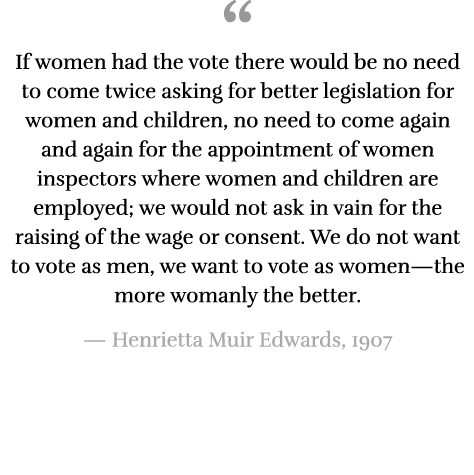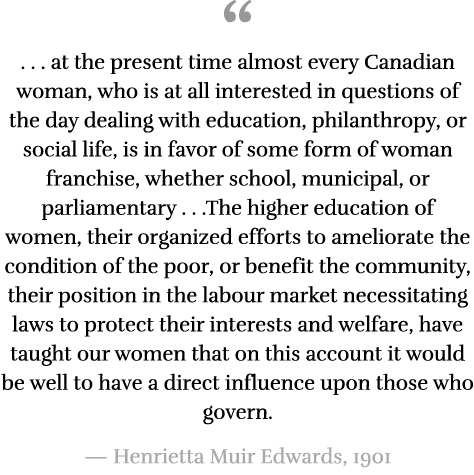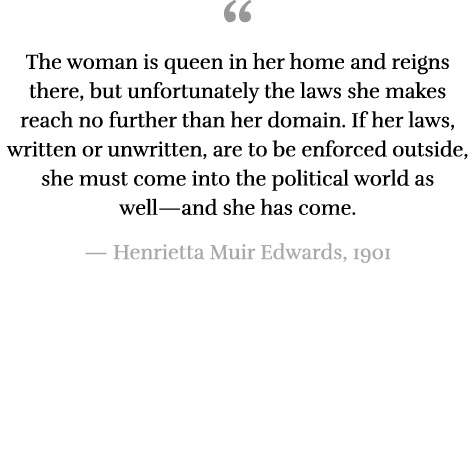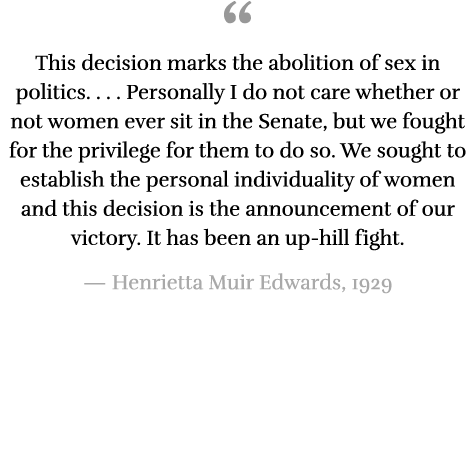Henrietta Muir Edwards was an activist for suffrage and political rights for women, worked closely with women's missionary societies for over four decades, and advocated public libraries, mothers' allowances, equal parental rights, equal grounds for divorce and penal reform.
In 1908, at the request of the Canadian government, Henrietta compiled a summary of Canadian laws, both federal and provincial, which pertained to women and children. She subsequently prepared two handbooks on legal matters affecting women entitled Legal Status of Women in Canada (1917), and Legal Status of Women in Alberta (1921). Henrietta was involved with the Women's Christian Temperance Union (WCTU), from 1886 and viewed temperance as an important cause. She was also President of the Ottawa YWCA during the 1890s. Henrietta helped establish the National Council of Women (1893), and was the Convenor of Laws for the National Council of Women for thirty-five years, she also worked together with Lady Aberdeen to co-found the Victorian Order of Nurses (1897).
Around 1903, the Edwards family moved west to Alberta, where Dr. Oliver Cromwell Edwards worked as medical officer on the Blood Indian Reserve, 40 miles west of Lethbridge. Henrietta remained there until her husband's death in 1915. This champion for women's rights then settled in Fort Macleod where she was chosen to chair the Alberta Laws Committee. When the Alberta executive of the National Council was formed, she became its President, and also served as the first Convenor of the Council's Standing Committee on Laws Affecting Women and Children. It is not surprising that she was the first President of the Alberta Local Council of Women since she served as the NCWC's key spokesperson and organizer in Alberta and on the prairies, having organized each of the Alberta Local Councils of Women starting in 1905.
Henrietta played an active part in securing legislation for the protection of women in Alberta. Before her involvement, there was no Dower Law in the province, and as a result a husband could sell any property held by the family. She was influential in working with other women to have an act passed requiring the wife's signature before her home could be sold. However, it was many years before the Dower Act was enforced. When the campaign for suffrage for women in Alberta developed, this leader played a major role.
When the “women as persons” controversy arose, Henrietta was 80 years of age and living in Southern Alberta. However, she accepted Mrs. Murphy's invitation to tea in her Edmonton home on August 27, 1927 and traveled by train for many hours in the heat.
Henrietta did much of the legal research required before Alberta's Famous Five could present their case to the Supreme Court as well as the Judicial Committee of the Privy Council. She was annoyed and disappointed when the Supreme Court of Canada announced on April 24, 1928 that the answer to the question, "Does the word "persons" in Section 24 of the British North America Act, 1867, include [female persons]?" was, "No!" Finally, on October 18, 1929, headlines throughout the British Empire repeated the news: "Privy Council Declares Women are Persons," and Henrietta cheered!
The Calgary Women's Canadian Club held a victory lunch for these remarkable women on January 23, 1930. As noted in the Albertan, when it came her time to speak, Henrietta said it was time to give credit where credit was due. She acknowledged the support of many women but said that it was also important to thank the men who had helped with this cause. "Well, not perhaps the Judges on the Supreme Court of Canada, but certainly the Lords on the Privy Council!"
Henrietta died in Fort Macleod on November 10, 1931, aged 82, and is buried in Edmonton with her husband and son. Her gravestone lists only family dates and a Bible verse.





